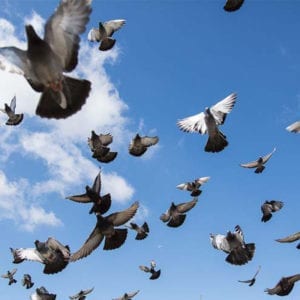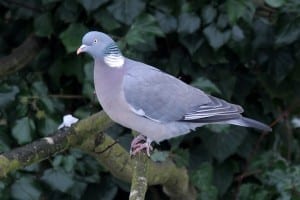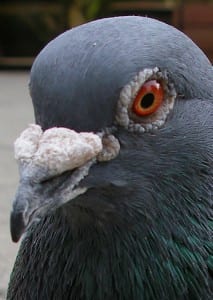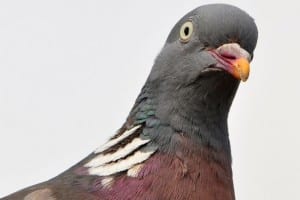
by Pigeon Patrol | Jun 19, 2016 | Bird Netting, Pigeon Patrol's Services, Pigeons in the News, UltraSonic Bird Control
 For pigeons, it seems, leadership is largely a question of speed.
For pigeons, it seems, leadership is largely a question of speed.
Researchers compared pigeons’ relative influence over flock direction to their solo flight characteristics. The studies showed that a pigeon’s degree of leadership could be predicted by its speed in earlier flights.
“This changes our understanding of how the flocks are structured and why flocks of this species have consistent leadership hierarchies,” said Dora Biro of the University of Oxford in London.
The latest GPS loggers allow the researchers to track not only the birds’ overall routes, but also the sub-second time delays with which they react to each other while flying as a flock.
“We can control the composition of the flocks and the starting points for their homeward journeys,” said Benjamin Pettit, first author of the study.
When the researchers tested the birds individually after a series of flock flights, they found that leaders had learned straighter homing routes than followers.
The new findings offer an elegantly simple explanation for the phenomenon of leadership in birds, with important implications for how spatial knowledge is generated and retained in navigating flocks.
“We also have a good understanding of their individual spatial cognition, in particular how their homing routes develop over repeated flights in the same area,” Pettit noted.
“Some birds are naturally faster and consistently get to the front, where they end up doing more of the navigation, which means on future flights they know the way better,” Biro added.
“You can compare this to a ‘passenger-driver’ like effect: drivers in a car have to pay attention while passengers are often unable to recall the route they were driven along, especially if they remained passive in the navigation process,” Biro explained.
A very simple, self-organising mechanism–such as that based on variation in speed–is sufficient for leadership to arise.
About Pigeon Patrol:
Pigeon Patrol Products & Services is the leading manufacturer and distributor of bird deterrent (control) products in Canada. Pigeon Patrol products have solved pest bird problems in industrial, commercial, and residential settings since 2000, by using safe and humane bird deterrents with only bird and animal friendly solutions. At Pigeon Patrol, we manufacture and offer a variety of bird deterrents, ranging from Ultra-flex Bird Spikes with UV protection, Bird Netting, 4-S Gel and the best Ultrasonic and audible sound devices on the market today.
Voted Best Canadian wholesaler for Bird Deterrent products four years in a row.
Contact Info: 1- 877– 4– NO-BIRD (www.pigeonpatrol.ca)

by Pigeon Patrol | Jun 15, 2016 | Bird Netting, Pigeon Patrol's Services, Pigeons in the News, UltraSonic Bird Control
 Norbiton residents passing under a popular railway bridge were fed up of being dumped on by pigeons.
Norbiton residents passing under a popular railway bridge were fed up of being dumped on by pigeons.
Nearly 100 people who lived near Norbiton Bridge signed a petition demanding that something be done to prevent the birds that lived in the rafters, making a mess.
Councillor Sheila Griffin said: “This is an ongoing problem and for some time many of my constituents have complained that they are sick of being dropped on by pigeons when they walk under the bridge.
“They have had expensive suits stained and the birds have also made a real mess of the pavements on Coombe Road.”
She added that it was the railway provider that should accept responsibility for the bird mess.
This was not the first time efforts had been made to get the birds to clean up their act.
The bridge had been pigeon-proofed some time before with netting, but so many of the birds had got caught in it that the plan was abandoned.
This time around, the Royal Society for the Protection of Birds got involved to ensure that a strict protocol was adhered to and no pigeons suffered injury or untimely death.
A Kingston Council spokesman said it would cost an estimated £8,000 to pigeon proof the bridge.
He said: “A notice has been served on Network Rail requiring it to do the work under the provisions of the London Government Act.
“The time on the notice runs out at the end of January. So far Network Rail has not appealed, but it might.”
About Pigeon Patrol:
Pigeon Patrol Products & Services is the leading manufacturer and distributor of bird deterrent (control) products in Canada. Pigeon Patrol products have solved pest bird problems in industrial, commercial, and residential settings since 2000, by using safe and humane bird deterrents with only bird and animal friendly solutions. At Pigeon Patrol, we manufacture and offer a variety of bird deterrents, ranging from Ultra-flex Bird Spikes with UV protection, Bird Netting, 4-S Gel and the best Ultrasonic and audible sound devices on the market today.
Voted Best Canadian wholesaler for Bird Deterrent products four years in a row.
Contact Info: 1- 877– 4– NO-BIRD (www.pigeonpatrol.ca)

by Pigeon Patrol | Jun 8, 2016 | Bird Deterrent Products, Bird Netting, Pigeons in the News, UltraSonic Bird Control
 Researchers have identified how a specific strain of salmonella is getting into Bermuda’s drinking water system, prompting environmental health officials to reiterate advice on how to avoid getting ill.
Researchers have identified how a specific strain of salmonella is getting into Bermuda’s drinking water system, prompting environmental health officials to reiterate advice on how to avoid getting ill.
The research team, led by doctoral student Shervon De Leon, took faecal samples from 273 creatures on the Island and discovered that feral chickens and pigeons were the main carriers of salmonella mississippi.
They concluded that although chickens cannot access rooftops, they can pass on the disease-causing bacterium to other animals, such as pigeons and lizards, at shared feeding grounds, which can lead to the contamination of water tanks and the spread of salmonella mississippi to humans.
Elaine Watkinson, a senior public health analyst, told The Royal Gazette that householders should treat untreated or “raw” water like raw meat, adding: “You have to do something to your food, such as cooking raw meat or washing vegetables and fruit. Don’t assume the water is safe.”
Susan Hill Davidson, acting chief environmental health officer, added: “We have more detail. It’s an opportunity for us to again get the message across and maybe some people like to listen to the science and that might be the thing that might spur them [to treat their water].”
David Kendell, director of the Department of Health, said adult Bermudians who had lived here all their lives might have developed some immunity to bacteria in tank water but others were at risk, especially bottle-fed infants whose formula was made using untreated water, and those with compromised immune systems.
“People need to really look at it in terms of protecting the health of their children,” he said.
The joint study into the source of salmonella mississippi — which is the predominant strain of salmonella in Bermuda and on the Australian island of Tasmania, but in very few other countries — was prompted by an earlier Caribbean-led burden of illness report.
That report found from the testing of human stool samples that salmonella poisoning accounted for almost half of the gastroenteritis cases in Bermuda, with some 70 per cent of those salmonella cases involving salmonella mississippi.
Gastroenteritis is a public health concern on the Island, with an annual incidence of one episode per person per year.
Mr De Leon, a student at the University of the West Indies, said his team suspected birds would play a major part in the transmission of salmonella mississippi and the study bore that out.
“We looked at feral chickens, birds, frogs, rats, and we found a high prevalence in feral chickens and in pigeons and in some of the other birds,” he said.
“[In the case of chickens], they pass it on to other birds that share feeding grounds because they all poop where they eat. The other birds that can fly will get on to rooftops and then rainfall washes that poop into your water tank and then people drink that water. If it’s not treated, you have people getting sick from that water.”
Of the 63 feral chickens that were tested, salmonella was detected in 35 and samples from 14 tested positive for salmonella mississippi.
The researchers also tested tap and tank water samples from 102 randomly chosen households, most of which were untreated.
The samples were not tested for specific pathogens but for general “coliform bacteria” that would indicate the possible presence of harmful, disease-causing organisms in the water. Nearly all tap and tank samples — 88 and 89 per cent, respectively — contained coliforms.
A questionnaire on use and treatment of rooftop-collected water from those households discovered that 65.7 per cent did nothing to treat their water.
Almost 100 per cent used the water for cooking, 89 per cent used it for drinking and 100 per cent used it for cleaning dishes.
The researchers, who presented their findings at the third international One Health Congress in Amsterdam last year, concluded: “Most Bermudian residential water is contaminated by bacterial faecal indicator species.
“Depending on the indicator, between 67 per cent and 90 per cent of tap samples surpassed government safe drinking water standards and few households treat their water. Drinking water is likely a source of gastroenteritis.”
The team said its findings suggested “no improvement” to household water supplies since the last study ten years ago.
Ms Hill Davidson said householders could take simple steps to protect themselves and their families, including chlorinating tank water regularly, boiling water for a minimum of three to five minutes, or installing a UV treatment system. Brita and similar filters do not remove bacteria.
She said the aim was not to scare anyone as drinking water was a healthy lifestyle choice, but to make people aware that untreated tank water could cause illness.
“Our budget constraints mean that we can’t do as much as we might like from the public education point of view,” she said. “[But] repeating the message is something we have done annually and certainly over and over again.”
About Pigeon Patrol:
Pigeon Patrol Products & Services is the leading manufacturer and distributor of bird deterrent (control) products in Canada. Pigeon Patrol products have solved pest bird problems in industrial, commercial, and residential settings since 2000, by using safe and humane bird deterrents with only bird and animal friendly solutions. At Pigeon Patrol, we manufacture and offer a variety of bird deterrents, ranging from Ultra-flex Bird Spikes with UV protection, Bird Netting, 4-S Gel and the best Ultrasonic and audible sound devices on the market today.
Voted Best Canadian wholesaler for Bird Deterrent products four years in a row.
Contact Info: 1- 877– 4– NO-BIRD (www.pigeonpatrol.ca)

by Pigeon Patrol | Jun 6, 2016 | Bird Deterrent Products, Bird Netting, Pigeons in the News, UltraSonic Bird Control
 THE risk of being hit by pigeon droppings as you walk under a city centre bridge is set to vanish as plans get under way to bird-proof the entire structure.
THE risk of being hit by pigeon droppings as you walk under a city centre bridge is set to vanish as plans get under way to bird-proof the entire structure.
Business owners in Fisherton Street and residents living close to the railway bridge called for action in November, saying the birds had become a health hazard and people walking under the bridge need umbrellas to protect themselves.
Salisbury city councillor Matt Dean said it was the “number one issue” that residents complain to him about and has now led the way in obtaining funding from the city council to solve the problem.
He said: “It’s been an ongoing problem for 15 years or so, and now, with the opening of the University Technical College at the former police station, even more people are walking under the bridge from the rail station.
“The bulk of the money for cleaning and bird-proofing the bridge is going to be spent by the city council and we’re going to ask Network Rail for a financial contribution.
“We hope Wiltshire Council is going to assist by paying for the Traffic Regulation Order for the one or two-night road closure – but we have yet to get their agreement. We’ve gone out for tender for the work and hope it will be complete in June.”
The bridge clean and bird-proofing measures are expected to cost between £3,500 and £6,000.
Cllr Dean said: “There are a number of possible different treatments which include spikes or a special paint which is invisible to the human eye but makes buildings or statues seem like they’re on fire, if you’re a bird. The latter was successfully used about a year ago on the Poultry Cross where it was terrible but it’s now completely sorted.
“This is part of a wider programme to protect our buildings from damage by pigeons. In our historical, medieval city, we have to look after our shops and visitors.
“If you sit down and eat in the market square, you get pecked by birds. We need to work with the Business Improvement District to get rid of birds from the city centre.”
Last year, nesting peregrine falcons in the cathedral spire helped make a difference to the number of pigeons in the city but it also led to some very public executions and the council is reluctant to hire birds of prey to keep birds away.
Paul Dauwalder, who runs three businesses in the Fisherton Street, said it was fantastic news, adding: “It’s one of the weak spots in the street. People have had to walk under that awful bridge for too long and run the gauntlet from these feral pigeons.”
About Pigeon Patrol:
Pigeon Patrol Products & Services is the leading manufacturer and distributor of bird deterrent (control) products in Canada. Pigeon Patrol products have solved pest bird problems in industrial, commercial, and residential settings since 2000, by using safe and humane bird deterrents with only bird and animal friendly solutions. At Pigeon Patrol, we manufacture and offer a variety of bird deterrents, ranging from Ultra-flex Bird Spikes with UV protection, Bird Netting, 4-S Gel and the best Ultrasonic and audible sound devices on the market today.
Voted Best Canadian wholesaler for Bird Deterrent products four years in a row.
Contact Info: 1- 877– 4– NO-BIRD (www.pigeonpatrol.ca)

by Pigeon Patrol | Jun 3, 2016 | Bird Netting, Pigeons in the News, UltraSonic Bird Control

A pigeon.
The SPCA is investigating possible pigeon poisoning in Auckland.
The bizarre scene, observed outside Vector Arena in central Auckland on Thursday morning, was attributed by residents to the birds eating a packet of chilli instant noodles.
The ordeal began after the birds began acting strangely in the early morning.
One of the drugged pigeons
Daniel Edwards, who lived nearby, found the sickly birds near a packet of opened instant noodles and spicy seasoning.
“It’s pretty sad. A lot of people hate pigeons, but they don’t annoy me,” he said.
Edwards and his friend chased away two large gulls away that had begun clawing at the incapacitated pigeons.
Daniel Edwards found a dozen sick and dying pigeons in Auckland on Thursday morning.
One pigeon was left with a wound in his side while another bird died.
A passer-by poured water on the distressed birds to help revive them from their sluggish state.
Local resident Cynthia Dickey said this was the third time in three months pigeons had been found in a similar state in the park.
In a previous incident, she said three pigeons died and the SPCA took the remaining 12 away for treatment.
Dickey said the birds were being poisoned by the human food being left scattered around the area.
The chilli seasoning would have been dangerously spicy for pigeons, she said.
“Their little mouths can’t cope with it. It would burn your tongue.”
However, SPCA Auckland chief executive Andrea Midgen said they were investigating if the birds were poisoned.
It was the second callout the SPCA had received to the area in a few months.
“In both cases the pigeons appear to be sick from the use of poison.
“The pigeons found today were particularly sick and had wounds from being attacked by seagulls.”
The birds were taken to NZ Bird Rescue where they were being cared for.
It was legal to poison pigeons in New Zealand but you must ensure the birds don’t suffer and not leave any sick birds behind, she said.
“No animal should be left to suffer like this.”
NZ Bird Rescue Trust spokeswoman Hilary Stollery said they had been alerted to more cases of bird poisoning in recent years.
Cafe owners would poison sparrows and pigeons which were seen as a nuisance, she said.
The Trust would like the practice banned.
Human food can also be toxic to birds, including dry noodles and chili, she said.
“It would expand in the poor creature’s stomach and kill them.”
Human food high in salt and chemicals was also bad for birds.
Anyone wishing to feed birds should give them bird seed, she said.
About Pigeon Patrol:
Pigeon Patrol Products & Services is the leading manufacturer and distributor of bird deterrent (control) products in Canada. Pigeon Patrol products have solved pest bird problems in industrial, commercial, and residential settings since 2000, by using safe and humane bird deterrents with only bird and animal friendly solutions. At Pigeon Patrol, we manufacture and offer a variety of bird deterrents, ranging from Ultra-flex Bird Spikes with UV protection, Bird Netting, 4-S Gel and the best Ultrasonic and audible sound devices on the market today.
Voted Best Canadian wholesaler for Bird Deterrent products four years in a row.
Contact Info: 1- 877– 4– NO-BIRD (www.pigeonpatrol.ca)

by Pigeon Patrol | May 30, 2016 | 4-S Gel Bird repellent, Bird Netting, Pigeon Patrol's Services, UltraSonic Bird Control
 Council orders staff to investigate ways to eliminate pigeon roosting at the Canada Summit Centre entrance.
Council orders staff to investigate ways to eliminate pigeon roosting at the Canada Summit Centre entrance.
HUNTSVILLE – Pigeons have been steadfastly opposing the municipality.
Pigeon control program in…
Despite the concerted effort of staff, pigeons have been roosting in large numbers at the entrance to Huntsville’s Canada Summit Centre. At the Dec. 21 council meeting, a motion was passed to escalate the town’s efforts in deterring the fowl.
Kari Lambe, executive director of community services and economic development, explained to council that there have been numerous attempts made to keep the birds from the Summit Centre and they have all been thwarted.
“We have tried a number of things in the past. We’ve tried the fake owls. We currently have the spikes. We even have the spikes serviced on a regular basis because the pigeons actually try to bump the spikes off and try to build nests on top of the spikes,” said Lambe.
“Pigeons actually try to bump the spikes off.”
– Kari Lambe
The pigeon issue has had serious consequences for the municipality. According to Lambe, staff members are routinely at the Summit Centre entrance dealing with it, which takes away from time they could be spending else where.
Scott Aitchison, mayor of Huntsville, said the whole problem has been exasperated by people within the municipality.
“I believe there are a number of well-meaning citizens feeding the pigeons at the Summit Centre. That’s probably not helping the situation,” said Aitchison.
Council voted to direct staff to investigate further options for keeping the pigeons away from the entrance.
About Pigeon Patrol:
Pigeon Patrol Products & Services is the leading manufacturer and distributor of bird deterrent (control) products in Canada. Pigeon Patrol products have solved pest bird problems in industrial, commercial, and residential settings since 2000, by using safe and humane bird deterrents with only bird and animal friendly solutions. At Pigeon Patrol, we manufacture and offer a variety of bird deterrents, ranging from Ultra-flex Bird Spikes with UV protection, Bird Netting, 4-S Gel and the best Ultrasonic and audible sound devices on the market today.
Voted Best Canadian wholesaler for Bird Deterrent products four years in a row.
Contact Info: 1- 877– 4– NO-BIRD (www.pigeonpatrol.ca)

 For pigeons, it seems, leadership is largely a question of speed.
For pigeons, it seems, leadership is largely a question of speed.

 Norbiton residents passing under a popular railway bridge were fed up of being dumped on by pigeons.
Norbiton residents passing under a popular railway bridge were fed up of being dumped on by pigeons.
 Researchers have identified how a specific strain of salmonella is getting into Bermuda’s drinking water system, prompting environmental health officials to reiterate advice on how to avoid getting ill.
Researchers have identified how a specific strain of salmonella is getting into Bermuda’s drinking water system, prompting environmental health officials to reiterate advice on how to avoid getting ill.
 THE risk of being hit by pigeon droppings as you walk under a city centre bridge is set to vanish as plans get under way to bird-proof the entire structure.
THE risk of being hit by pigeon droppings as you walk under a city centre bridge is set to vanish as plans get under way to bird-proof the entire structure.


 Council orders staff to investigate ways to eliminate pigeon roosting at the Canada Summit Centre entrance.
Council orders staff to investigate ways to eliminate pigeon roosting at the Canada Summit Centre entrance.